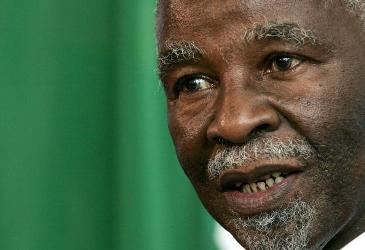African mediator struggles to prevent collapse of talks on Sudan’s Two Areas
February 16, 2014 (KHARTOUM) – The African Union High-Level Implementation Panel (AUHIP) is struggling to prevent the failure of peace talks on the conflict in the Two Areas, as the negotiating parties trade accusations of foiling the process.

Mbeki held “separate encounters with the head of the Sudanese government delegation Ibrahim Gandour and the SPLM-N chief negotiator Yasir Arman before to convene a joint meeting with both of them”, the sources further said.
The two parties are supposed to resume direct discussions Monday as the chief mediator is drafting a new paper to be submitted to the negotiating delegations based on the outcome of three meetings they held since 13 February.
The US special envoy, Donald Booth, reportedly is also exerting efforts to ensure the continuation of the process where the mediation hopes at least at this round to come out with a cessation of hostilities between the two sides.
Mbeki before the start of talks was in Washington where he asked the American administration to support his efforts in this difficult peace process.
The two delegations in statements sent to Sudan Tribune accused each other of hampering the negotiations, but none of them announced its withdrawal from the talks.
The Sudanese government delegation accused the SPLM-N of rejecting the UN decision 2046 (2012) and a proposal made by the AUHIP on 17 September 2012 including a comprehensive proposal to end the conflict from its political, security and humanitarian angles.
The rebels claim that their “unique reference point is the framework agreement signed on 28 June 2011 and say they will not recognise any other reference or discuss anything else”, says a statement signed by the government chief negotiator Ibrahim Gandour released on Sunday.
On the other humanitarian access, Gandour went to say that the rebel refuse the tripartite initiative signed with UN agencies, African Union and Arab League.
The UN Security Council resolution 2046 which is based on the decisions of the African Union Peace and Security Council calls on the two parties to negotiate a peaceful settlement for the conflict in South Kordofan and Blue Nile based on a 28 June deal brokered by the AUHIP.
On the other side, Abdelrahman Ardol, the spokesperson of the SPLM-N negotiating team accused the government of seeking to control the whole mechanism of humanitarian assistance to civilians in the rebel held areas “in flagrant contradiction with the AU and UN Security Council decisions”.
The SPLM-N demands a “humanitarian cessation of hostilities in line with the international standards,” Ardol further said.
The rebel delegation sticks “also to the comprehensive solution which includes all the political forces and civil society groups” he further pointed out.
The rebel spokesperson said a constitutional conference should be organised by an inclusive national government to “discuss how to govern Sudan and not how governs Sudan” and to establish the citizenship state without discrimination.
The Sudanese government refuses to form one forum to discuss the armed conflicts in Darfur and Blue Nile and South Kordofan states. Khartoum also refuses to involve the opposition parties in the process but says the rebel can take part in a national dialogue when they sign a peace deal.
The SPLM-N says no genuine peace can be realised without the participation of all the Sudanese forces to determine the future of the country.
(ST)
